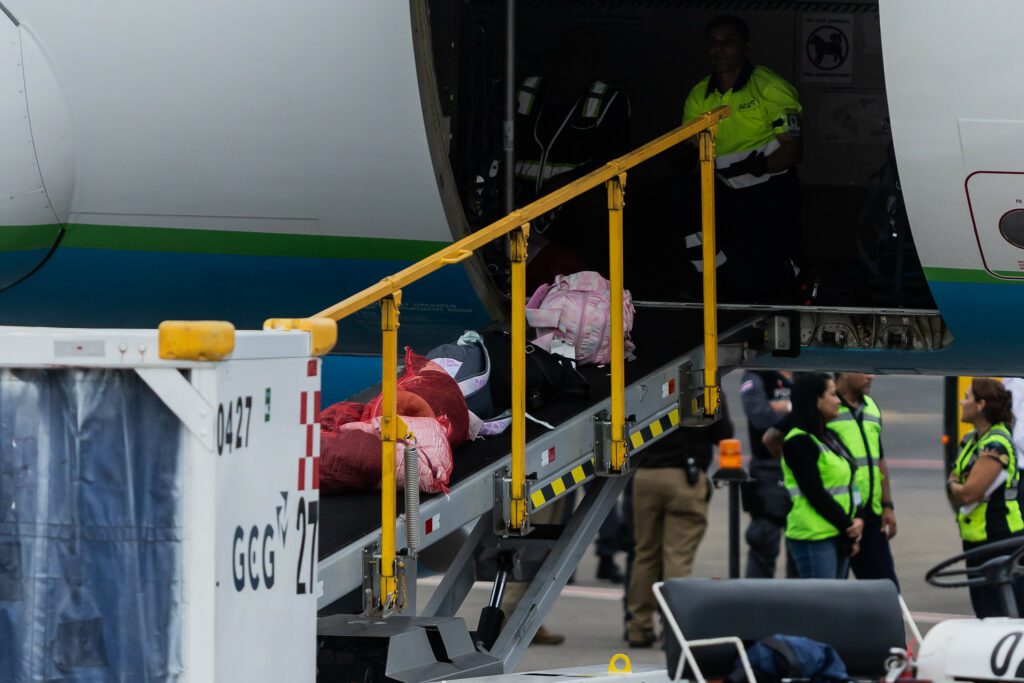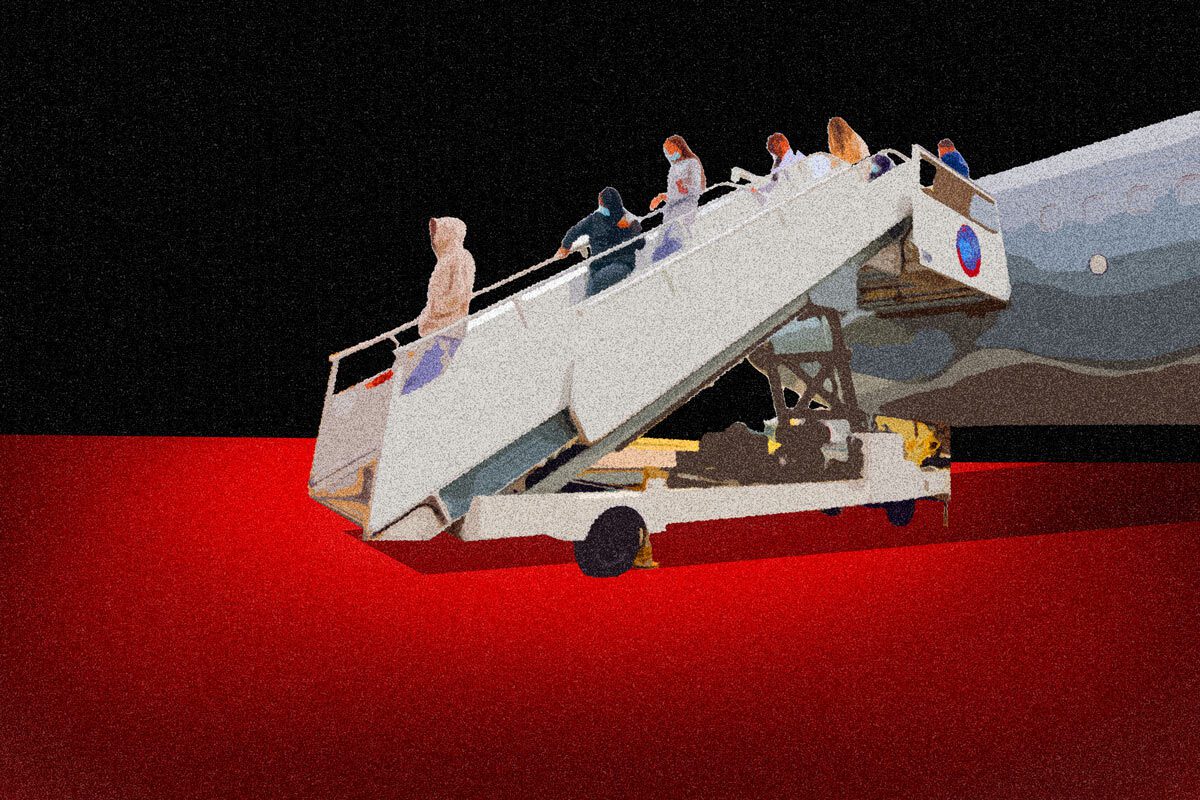The anti-imperialist discourse of Daniel Ortega and Rosario Murillo’s regime has been little more than rhetoric, masking a consistent and effective collaboration with recent U.S. governments in the reception of deported Nicaraguans. Unlike its dictatorial counterparts—Cuba and Venezuela—which have been reluctant to accept their deported citizens, Nicaragua has fully accepted all Nicaraguans expelled from the United States by the Department of Homeland Security (DHS).
The first plane carrying deported Nicaraguans under Trump’s second term reportedly arrived on February 12, 2025, with 93 repatriated individuals, according to La Prensa, citing official media sources. The previous flight, under former President Biden’s administration, had arrived on January 23 of the same year, carrying 95 deportees.
The Ortega-Murillo regime’s reception of these individuals has been no different from its approach under previous U.S. administrations over the past 11 years. Since Barack Obama’s presidency in 2014, through Trump’s first term, and up until Biden’s final year in office in 2024, Daniel Ortega has received 18,660 deported Nicaraguans. This places Nicaragua among the top 10 countries with the highest number of citizens expelled from the U.S., according to DHS data.
At least 3,100 Nicaraguans were deported in Obama’s last three years, 5,590 in Trump’s first term, and 9,960 during Biden’s administration—the highest number under any administration.
During this same period, U.S. Immigration and Customs Enforcement (ICE) carried out 47,580 administrative arrests through its Enforcement and Removal Operations (ERO) unit. Of these, 1,950 occurred under Obama, 2,600 under Trump, and 43,030 under Biden, making his administration the most aggressive in terms of immigration detentions.
Nicaragua Has Always Accepted Deportees

Divergentes | Miguel Andrés.
In recent weeks, several planes carrying deported Central Americans have arrived in the region. In addition to Nicaragua, Costa Rica received 135 deported individuals on February 20.
Migration expert Manuel Orozco notes that “Nicaragua has always accepted deportees,” and this has continued uninterrupted across different U.S. administrations. Between 2014 and 2024, Nicaragua accounted for 3% of total U.S. deportations, but in the last three years, this number has risen to 7%, reflecting the country’s growing migration flow, according to Orozco’s analysis. He predicts this trend will continue.
In contrast to Nicaragua, Cuba and Venezuela—the region’s other two authoritarian regimes—have been “reluctant” to accept their deported citizens due to strained diplomatic relations with the United States.
A Washington Post report reveals that 42,084 Cubans in the U.S. face deportation orders, yet Cuba has only accepted 4,662 deportees over the past decade. Meanwhile, 17,940 Venezuelans are at risk of deportation, but Venezuela has only received 5,862 during the same period.
This makes Cuba and Venezuela the first and third-ranked countries, respectively, with the highest number of citizens under deportation orders but the lowest acceptance rates.
Although Nicaragua has taken the opposite approach, Orozco argues that the Ortega-Murillo regime’s voluntary cooperation in receiving deportees “is not a strategy to appease the dictatorship.”
“The difference is that the Nicaraguan government is actively publicizing its cooperation to highlight that it is not antagonizing anyone,” he explains. Orozco also notes that the high number of Cubans and Venezuelans with deportation orders stems from a recent migration surge over the past four years, causing a backlog in cases. However, neither Cuba nor Venezuela has stopped receiving deportees—they just accept them in “very small numbers.”
Over 100,000 Nicaraguans at Risk of Deportation

Divergentes | Miguel Andrés.
Migrant rights advocates warn that individuals under humanitarian parole status remain highly vulnerable and could fall into irregular status at any moment.
It is still uncertain how much deportations will increase in 2025, Orozco states, as “the political landscape, financial costs, and human effort involved are immense and difficult to quantify.”
According to data obtained through the Freedom of Information Act and analyzed by Orozco, 63,300 Nicaraguans received deportation orders between 2018 and 2024. Of these, only 20% have been detained and removed. Before 2018, at least 80,133 Nicaraguans had deportation orders, but only 5% were actually expelled.
This means that 126,766 Nicaraguans are currently at risk of deportation.
This figure does not include the nearly 95,000 Nicaraguans caught in legal limbo after entering the U.S. under the humanitarian parole program, which was revoked by a Trump executive order on January 22.
President Trump also ordered a halt to all ongoing immigration processes initiated by these individuals, affecting applications for political asylum, family-based residency petitions, work visas, student visas, and other legal pathways.
Angélica Salas, executive director of the Coalition for Humane Immigrant Rights (CHIRLA), warns that the immigration status of individuals who entered the U.S. under humanitarian parole is “highly vulnerable” and could become irregular at any moment.
“We are in a very problematic situation because many asylum seekers assumed their cases would continue and allow them to stay, but their legal status is now extremely fragile. Those who arrived on parole and currently have work permits might wake up tomorrow as undocumented individuals without permission to work,” she tells Divergentes.
A Xenophobic and Racist Perspective
“This administration is operating in an unprecedented manner. We are expecting anything from them because they do not follow the rules that have existed for years. They have a deeply xenophobic and racist perspective, believing that allowing immigrants from Hispanic, Caribbean, African, or Asian countries diminishes the quality of U.S. citizenship,” Salas continues.
While immigration processes will eventually have to resume, she warns that the requirements for continuation or approval will be significantly stricter, with the ultimate goal of increasing rejection rates. “The level of scrutiny being applied to immigration decisions is now much harsher,” she adds.
Salas also stresses that Trump’s order to pause immigration processes for Nicaraguans under parole status puts them at serious risk if they are forced to return to their home country, particularly those who applied for political asylum. While Nicaragua has not refused deportation flights from the U.S., Salas does not rule out the possibility if this particular group of individuals is targeted.
So far, the Ortega-Murillo regime has remained silent on Trump’s deportation orders and its plans for reintegrating repatriated Nicaraguans.
Meanwhile, in an apparent bid to curry favor with Trump, Nicaragua’s military chief, Julio César Avilés, has stated that the country is firmly committed to combating irregular migration to the United States.





